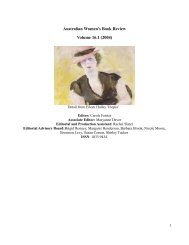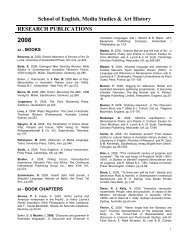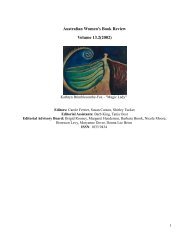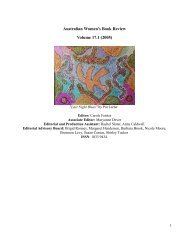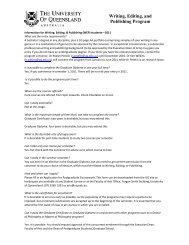Australian Women's Book Review Volume 14.1 - School of English ...
Australian Women's Book Review Volume 14.1 - School of English ...
Australian Women's Book Review Volume 14.1 - School of English ...
Create successful ePaper yourself
Turn your PDF publications into a flip-book with our unique Google optimized e-Paper software.
erudite and learned through this mish-mash <strong>of</strong> canonical references. It is mainly to the characters <strong>of</strong><br />
Goja, Goldie and Charity, however, that the narrator talks, as we all do to the voices inside our head,<br />
accusing them <strong>of</strong> sorrow, hurt and unfairness. In one insightful moment the narrator is asked: '”Who<br />
are you shouting at?” At myself? At the pain? At the whole <strong>of</strong> India?'<br />
Namjoshi's analysis <strong>of</strong> sexism, class privilege and homophobia in the East and racism in the West is<br />
lucid, but drawn out and at times self-torturing. Post-colonial politics are engaged when the <strong>English</strong><br />
language is referred to as a coloniser <strong>of</strong> the mind but also as the key to another life <strong>of</strong> poetry and<br />
writing. One <strong>of</strong> the most provocative aspects <strong>of</strong> this book is its experiments in form, which include a<br />
chapter on language as a forest, a fable about the black piglet and the queen <strong>of</strong> spades (mirroring a<br />
thread from Namjoshi's Building Babel), self-reflexive narration, poetry, fairytale, straight<br />
autobiography, and an almost continuous dialogue with various interrogators <strong>of</strong> conscience. While<br />
these variations could arguably be said to reflect the search for an appropriate form in which to write<br />
such an autobiographical myth, it is the 'straight' storytelling which is the most readable and engaging.<br />
If I were giving a lecture on this, I'd say that this is what I've been trained to read; that the confusion <strong>of</strong><br />
hybrid textual forms proves just how fixed we've become in anticipating storylines. On another level,<br />
however, the tortured textual position <strong>of</strong> being Indian, aristocratic, and lesbian becomes repetitively<br />
self-flagellating (I've never understood Catholic culture) and comparable to that <strong>of</strong> the seventies<br />
Toronto academics in the book who 'complain' that it's not their fault they are white, male, or<br />
heterosexual. Perhaps the confusion <strong>of</strong> the title is telling: this autobiographical myth is not about Goja.<br />
Goja is one <strong>of</strong> many characters whose voice is important, dominant and female in the narrator's<br />
imagination. Goja is a fantasy <strong>of</strong> a servant speaking, a personal reconciliation, an elegy.<br />
Alison Bartlett teaches literature at the University <strong>of</strong> Southern Queensland. Her most recent<br />
book was Postgraduate Research Supervision: Transforming (R)elations, edited with Gina Mercer.<br />
27



